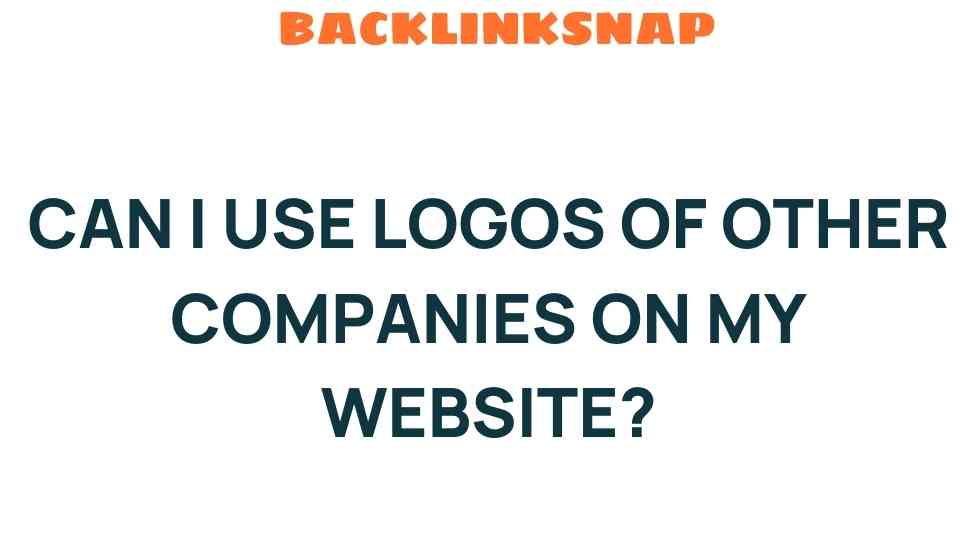Can I Use Logos of Other Companies on My Website? The Legal Truth Revealed
When designing a website, one of the most pressing questions that arise is: can I use logos of other companies on my website? This inquiry stems from a broader concern about logo usage, copyright law, trademark infringement, and the implications of online branding. Understanding the legal guidelines surrounding these topics is essential for anyone wanting to establish a credible and compliant online presence.
The Basics of Intellectual Property
To grasp the complexities of logo usage, it’s vital first to understand the concept of intellectual property (IP). Intellectual property encompasses creations of the mind, including inventions, literary and artistic works, symbols, names, and images used in commerce. Logos fall under trademark law, which protects brand identity and helps consumers distinguish between different products and services.
Trademarks are particularly crucial in today’s marketplace. They signify the source of goods or services and can be registered or unregistered. In many cases, using another company’s logo without permission can lead to legal ramifications, particularly if the logo is trademarked.
Copyright Law and Trademark Infringement
Copyright law protects original works of authorship, while trademark law specifically protects brands. Using a logo without permission can lead to accusations of trademark infringement. Here’s what you need to know:
- Trademark Ownership: If a company has registered its logo as a trademark, it has exclusive rights to that logo in the context of its goods and services.
- Infringement Risks: Using a trademarked logo can confuse consumers regarding the source of the products or services, which can lead to legal action from the trademark holder.
- Consequences: Legal consequences might include cease-and-desist letters, monetary damages, and in some cases, the requirement to destroy materials bearing the infringing logo.
Understanding Fair Use in Logo Usage
So, where does fair use fit into logo usage? Fair use is a legal doctrine that allows limited use of copyrighted material without permission from the rights holders. However, its application in the context of trademarks is quite limited. Here are some important points to consider:
- Descriptive Use: You may use a logo descriptively if you’re discussing the product or service it represents, but this is a gray area and should be approached cautiously.
- Non-Commercial Use: In some cases, using a logo for educational or non-commercial purposes may fall under fair use, but this is not guaranteed.
- Transformative Use: If your use of a logo significantly transforms its original purpose or message, it may qualify for fair use, but again, legal advice is recommended.
Legal Guidelines for Using Logos
When considering using another company’s logo, adhering to legal guidelines is paramount. Here are steps to follow:
- Seek Permission: Always ask for permission from the logo owner. This is the safest route and can help avoid legal issues.
- Check Licenses: Some companies offer logos under specific licenses that outline how they can be used, so review these carefully.
- Consult Legal Experts: If in doubt, consulting a lawyer who specializes in IP law can provide clarity on your specific situation.
Creating Your Own Brand Identity
With the legal complexities surrounding logo usage, it’s often wiser to focus on creating your own brand identity. Developing a unique logo not only protects you from legal issues but also enhances your online branding. Here are some tips for crafting a distinctive logo:
- Know Your Audience: Understand who your target audience is and what appeals to them.
- Research Competitors: Look at competitors’ branding to ensure your logo stands out and doesn’t infringe on other trademarks.
- Hire Professionals: Consider hiring a graphic designer who specializes in logo design to ensure a high-quality and unique outcome.
FAQs about Logo Usage
1. Can I use a logo if I give credit to the company?
Giving credit does not negate the need for permission. You must still obtain authorization from the trademark owner.
2. What if I use a logo in a blog post discussing the company?
Using a logo in a descriptive context may be acceptable under fair use, but it’s always best to seek permission to avoid potential issues.
3. Are there any exceptions for non-profits or educational use?
While educational and non-profit uses may sometimes qualify for fair use, it’s not guaranteed. Always verify with legal counsel.
4. What are the consequences of trademark infringement?
Consequences can include legal action, fines, and the requirement to cease use of the logo.
5. How can I find out if a logo is trademarked?
You can search the U.S. Patent and Trademark Office (USPTO) database or consult an IP lawyer for assistance.
6. What should I do if I receive a cease-and-desist letter?
Consult with a lawyer immediately. They can guide you on how to respond and the necessary steps to take.
Conclusion
In the ever-evolving digital landscape, understanding the legalities surrounding logo usage is essential for protecting your brand and reputation. While the temptation to use established logos for your website may be strong, the risk of trademark infringement and copyright issues far outweighs the benefits. By focusing on creating your own brand identity, seeking proper permissions, and adhering to the legal guidelines laid out above, you can ensure that your online presence is both compliant and effective.
For more detailed information on intellectual property rights, you can check the Cornell Legal Information Institute. If you’re interested in logo design tips, consider visiting this resource for insights on effective branding.
This article is in the category Digital Marketing and created by BacklinkSnap Team




